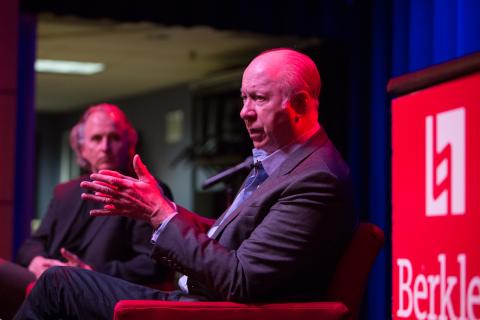David Gergen Shares Insights on Clinton, Trump, Election 2016 at Berklee

David Gergen—political adviser to four presidents, Harvard Kennedy School professor, and CNN political analyst—recently shared his insights on the 2016 presidential election with Berklee President Roger H. Brown and the audience at the college’s David Friend Recital Hall.
Mike Spencer
In introducing David Gergen to a packed room at Berklee’s David Friend Recital Hall on Wednesday, Berklee President Roger H. Brown said that the well-known commentator and academic is perhaps the busiest person this election cycle outside of the candidates themselves. And it’s no wonder: outside of his professorship at the Harvard Kennedy School, Gergen is a senior political analyst for CNN and the ultimate Washington insider, having been an adviser to four U.S. presidents (Richard Nixon, Gerald Ford, Ronald Reagan, and Bill Clinton).
Despite his busy schedule, Gergen stopped by Berklee for an hour to share his insights on the election in a talk moderated by Brown. The pair discussed everything from increasing disaffection and polarization among American voters to what the next president needs to work on. During the second half of the chat, Gergen took student questions on issues ranging from the problem of mass incarceration to President Obama’s handling of his relationship with Congress. Below are edited and abridged excerpts from Gergen’s comments.
On the two main candidates’ low popularity ratings:
“This is the first time in American history that we’ve had two such unpopular people. Whoever gets elected is going to have to deal with a lot of mistrust out in the countryside. There’s going to have to be a lot of healing that goes on and efforts for transparency—maybe put an ethics officer in the White House.”
On Hillary Clinton facing accusations of untrustworthiness:
“This is a result of the fact that she is a woman who represents a new wave of very professional women who have been in power and want to be on the front lines, working on problems. And when she did that in Arkansas, when she started as first lady, she came under a lot of attack… and she’s been under constant attack most of her professional life.”
On women in power and Donald Trump:
“A lot of guys in my generation are scared by women and are uncomfortable. We just haven’t gotten over it. My generation needs to grow up. The younger generation, you’ve left us behind a long time ago, or I hope you have, and you live much more in a world in which women should enjoy full equality. But it’s been slow in coming to older white men. And that’s a problem. Donald Trump is a walking example of someone who’s dismissive of women. Can you imagine what it’s like for him to think that he might be beaten by a woman? Serves him right.”
On the plight of the working class:
“They grew up in an America in which our economic growth was about three percent a year… Now we’re lucky to hit two [percent], and the money that is coming in is going, disproportionately, to the top. So you’ve got a bunch of people whose jobs are disappearing—their manufacturing jobs are disappearing—and the American Dream is smashed for them.”
On crime legislation, mass incarceration, and systemic racial inequities (in response to a question from Aliya Cycon ‘15):
“I was there working for Bill Clinton in ‘93/‘94 when he got the bill passed to crack down on crime … [but] that bill had in it the seeds of a lot of injustice. We locked up too many people for drug possession…and it wound up falling heavily on African-American men. There’s a real effort to step back from that and to change those laws and to move more toward rehabilitation.”
On President Barack Obama and Congress (in response to a question from student Colescott Rubin):
“There’s no question that he couldn’t get the cooperation that he needed and deserved. We’ve moved increasingly away from cooperation. Presidents rarely get honeymoons anymore. They used to get a period where everybody said, ‘Okay, let’s give you a shot.’ And the Republicans didn’t give him much of a shot. Republicans will come back at you and say, ‘But he didn’t reach out to us.’ Barack Obama has many, many strengths: he is a virtuous man, he’s got very little scandal, and he does some big, big things. Having said that, I think that his own allies would tell you he’s not warm and friendly and outgoing with members of Congress. He just hasn’t developed the kinds of relationships that I think are necessary to make that place work.”
On America’s political divisions:
“The center has basically disappeared… and that has made this polarization so much worse. And then along comes social media on top of that, where people can go choose the information they want to watch. Political scientists call this ‘confirmation bias’—that is, you read and listen to people who confirm your biases, as opposed to reading and listening to people who have different views so that you have a different perspective. In our politics, [the latter] has become verboten.”
On how Millennials and Generation X can change the world:
“I'm very pessimistic about our politics right now but I think there’s a lot more hope in the Millennial generation and Generation X than what there has been in the Baby Boomer [generation]. I come out of the Baby Boomer population and, I tell you, I think we are the ones who messed this thing up a lot. We were coddled when we were young and I don't think we’ve been very responsible. What I see coming? A lot of young people who are social entrepreneurs, who want to create things for the poor, and use your music and use your creativity to actually advance things. I see a lot more of that going on.”
